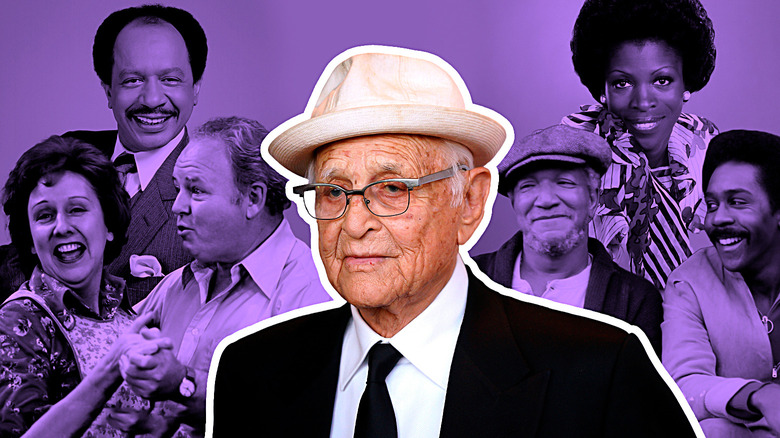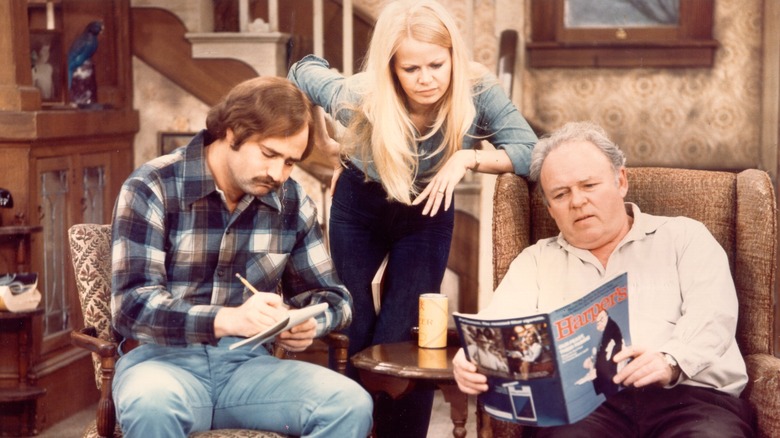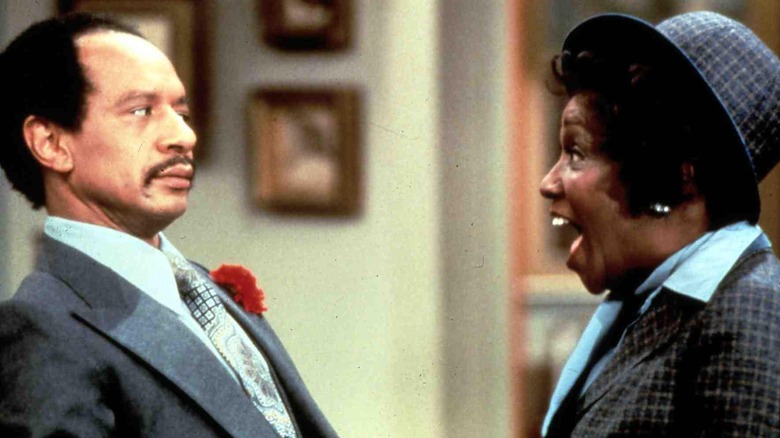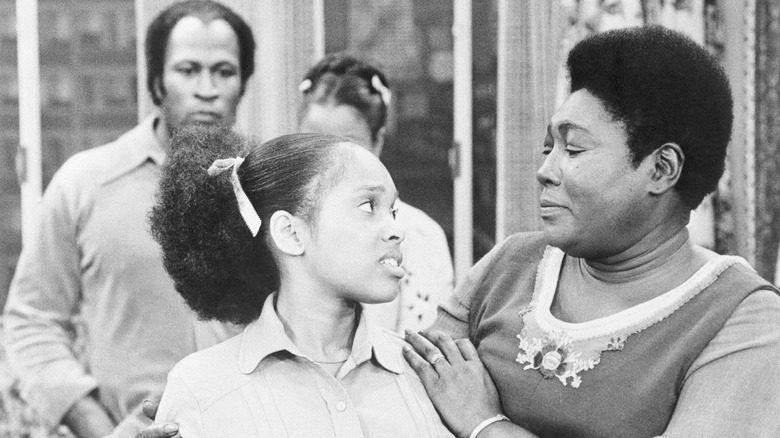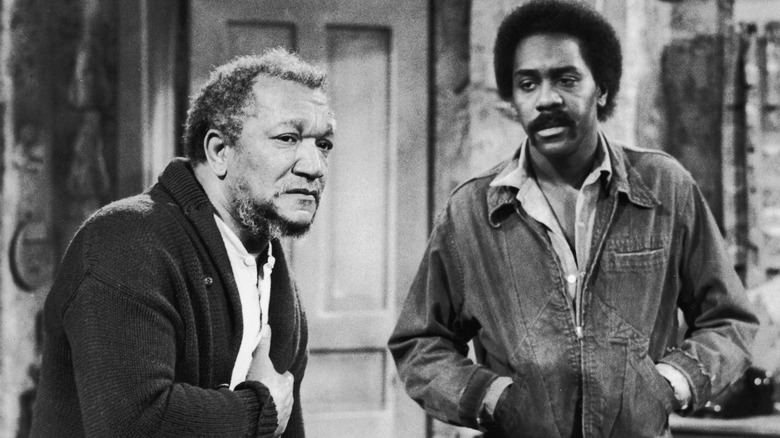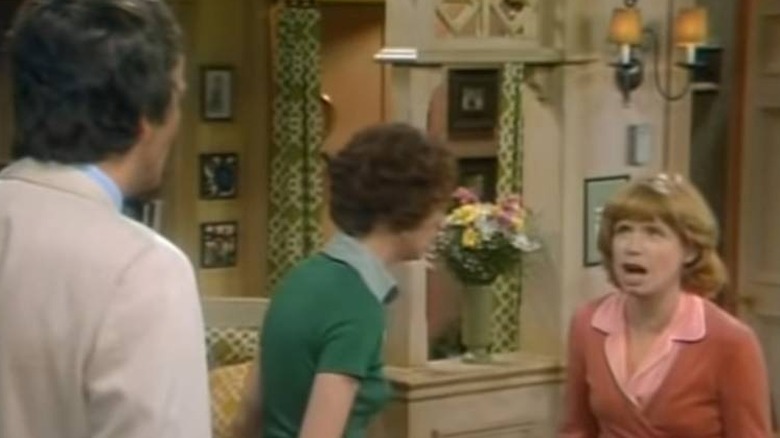How Norman Lear's Most Famous Shows Changed TV History
It's not hyperbole to say Norman Lear changed television forever. He was a writer, producer, and creator who brought to life numerous sitcoms that continue to influence comedies to this day. His resume includes over 100 credits, with him working in many capacities over the years. But anyone wanting to know where to start when diving into Lear's filmography may ask, "What is Norman Lear most famous for?"
His career may go back to the 1950s, but it was in the '70s that things really started happening. He created and produced many popular comedies that would go on to define a decade, and even though some episodes are 50 years old at this point, many hold up incredibly well. Anyone interested in comedy should absolutely watch shows like "Maude," "The Facts of Life," and "Silver Spoons" to start. Not only were these shows funny, but they also broke ground by tackling subjects not often depicted in television, such as "Maude" making TV history by having a two-part episode dealing with abortion.
However, as a tribute to Lear after his death at the age of 101, we should look at what are arguably his five most important TV series and how they changed entertainment forever.
All in the Family allowed sitcoms to be political
It's impossible to discuss the legacy of Norman Lear without diving into his magnum opus — "All in the Family." When the sitcom premiered in 1971, it was unlike anything that came before. The show regularly tackled hot-button issues that were plaguing the United States coming out of the cultural revolution of the 1960s. And at the center of the program was Archie Bunker (Carroll O'Connor), a bigoted man who had zero qualms about using racial epithets, including toward his son-in-law, Michael Stivic (Rob Reiner).
Archie represented an older subset of Americans, who were increasingly being left behind by a more open-minded generation, represented by Michael. And while Archie regularly used language that would probably get him canceled today, it was always made abundantly clear that he was in the wrong. His viewpoints were regularly challenged, with plenty of episodes putting him in his place by the end. It's commonplace for TV shows to get political these days, but "All in the Family" paved the way.
Another politically-charged series — "South Park" — drew direct inspiration from Archie Bunker, with Eric Cartman effectively being Archie as a young child. Throughout the show's nine seasons, "All in the Family" tackled issues like the Vietnam War, racism, women's liberation, and more. It opened the doors for TV shows to have real discussions, but even with its more serious bent, it never lost sight of the comedy.
The Jeffersons brought a Black perspective to American households
The Jefferson family was initially introduced in "All in the Family" before moving on up to that deluxe apartment in the sky. "The Jeffersons" was led by George Jefferson (Sherman Hemsley), who was similarly as bigoted and boisterous as Archie Bunker. However, as a Black man, he had unique viewpoints all his own, including a general distrust of white people.
Similar to its predecessor, "The Jeffersons" tackled serious issues within the framework of a sitcom, but this time, it was from a Black perspective. The show also broke boundaries by having the first mixed-race couple on a TV series with Tom (Franklin Cover) and Helen Willis (Roxie Roker). Through this, "The Jeffersons" was able to comment on race in a way other shows couldn't, diving more into the nuances of the American fabric.
More than anything else, "The Jeffersons" proved a sitcom with a predominantly Black cast could be successful. Other shows, like "Amos 'n' Andy," had come before, but "The Jeffersons" broke the mold by portraying an upper-middle-class Black family. It's easy to draw a line between the success of the sitcom and others that would follow, from "The Cosby Show" to "Black-ish."
Good Times featured the first Black nuclear family on TV
Before "The Jeffersons," Norman Lear developed another Black-led sitcom that holds the distinction of showcasing the first African American nuclear family — "Good Times." The show was a spin-off of "Maude," which itself was a spin-off of "All in the Family." It first aired in 1974, honing in on the Evans family led by patriarch James (John Amos) and matriarch Florida Evans (Esther Rolle). While J.J. (Jimmie Walker) became a breakout character, mostly due to his catchphrase, "Dy-no-mite," the show followed in its predecessors' footsteps by tackling sensitive topics.
Unlike "The Jeffersons," which had a higher-class Black family at the center, the Evans clan was more pressed for cash. Plotlines often centered on the family attempting to overcome poverty, with James often having to perform manual labor when he wasn't unemployed. As such, the sitcom was relatable to anyone who faced adversity in trying to get over economic boundaries, Black or white.
The show wasn't without criticisms at the time, especially when it came to J.J., whom many criticized for exemplifying racial stereotypes, especially in the later seasons. But along with "The Jeffersons," "Good Times" showed there was an appetite for Black-centric storytelling on TV. And it opened doors for more Black creators behind the scenes of productions. Norman Lear may have developed and produced "Good Times," but the creators were two Black men — Mike Evans and Eric Monte.
Sanford and Son introduced an astounding Black comic to a new audience
Before it was commonplace to give stand-up comedians their own sitcoms with the likes of "Seinfeld" and "Everybody Loves Raymond," Redd Foxx blew the doors down with "Sanford and Son," which debuted in 1972. Norman Lear developed the sitcom with Bud Yorkin, and it capitalized on the success of Foxx. The show made use of his streetwise attitude, where he played a junk dealer, Fred, who lives with his son Lamont (Demond Wilson).
The show utilized edgy, primarily racial humor, with Fred often espousing bigoted viewpoints toward anyone who wasn't Black. As would be the case with "Good Times," there would be criticisms directed toward the show about falling into stereotypes when depicting Black characters. This could likely be attributed to the fact that "Sanford and Son" had mostly white writers. However, some Black artists, like Paul Mooney and Richard Pryor, would cut their teeth on the series.
More than anything, "Sanford and Son" pushed boundaries like "All in the Family," sending television toward an edgier (but not necessarily more political) space. While Fred spoke his mind, the show rarely delved into political topics; instead, characters simply spoke their minds about issues directly impacting them. It was different from other shows in that manner, as Norman Lear told USA Today, "We didn't compare ('All in the Family' and 'Sanford and Son'), but the characters called it like they saw it in their own neighborhoods." "Sanford and Son" offered a showcase for Black actors who likely wouldn't have gotten a starring role otherwise in the period, and it pushed boundaries of what TV shows could discuss, deviating from the more escapist fare of the era.
One Day at a Time shook up the sitcom family formula
By 1975, the American household was changing. People were beginning to move away from concepts surrounding the nuclear family, often depicted on sitcoms like "My Three Sons" and "Leave It to Beaver." "One Day at a Time" shook things up by centering single divorced mother Ann Romano (Bonnie Franklin) trying to raise her daughters. It followed the typical Norman Lear template by interjecting jokes within discussions of serious issues, particularly new relationships as the daughters got older. With a younger female cast, "One Day at a Time" dealt heavily with feminism.
With such pertinent themes, it should come as no surprise the formula continued to be relevant, and the show received a reboot from Netflix years later with the same title. The major difference this time is that the family is Cuban American, so there's a greater racial component, but the show wasn't long for TV as "One Day at a Time" ended up being canceled twice.
When attempting to figure out what Norman Lear is famous for, he championed shows that gave voice to characters who hadn't really been represented before, whether they were Black families or single mothers. And while all of Lear's best shows tackled serious issues, they were still sitcoms at heart. The characters were largely likable, and amid the turmoil and economic uncertainty, they would crack jokes and laugh. That's what Norman Lear gave the world most of all — he showed you could still laugh in the darkest of times.
